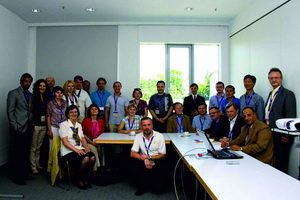
EAGE has more than 16,000 members from almost all countries in Europe and the world. Since its establishment, it is generally a geophysical association, however, geological topics are regularly highlighted. In the international arena, EAGE competes with the American SEG (Society of Exploration Geophysicists) and AAPG (American Association of Petroleum Geologists), and on the continent - with the annual EGU Assembly (European Geological Union), in fact, the European Geological Congress. The European Association of Geoscientists and Engineers operates in two main divisions; the first deals with oil and gas geosciences and the second one deals with near-surface geophysics. In addition to the Houten (Netherlands) headquarters, there are three EAGE regional offices in Russia and the CIS, Middle East, Asia Pacific and a service center in Kyiv. EAGE has associated geological and geophysical societies in 31 countries, as well as 19 student offices (two of them are in Ukraine in Kyiv and Dnipropetrovsk universities). The Association publishes 5 scientific journals - First Break, Petroleum Geoscience, Geophysical Prospecting, Near Surface Geophysics, Basin Research, as well as monographs, textbooks, dictionaries, guides, maps and atlases, organizes conferences and seminars, field lectures, self-improvement courses and online courses through the Learning Geoscience web portal, supports its own EarthDoc publication databases and EarthDat data. EAGE publications, all of which are subject to independent external peer review, are indexed by the world's leading scientific publications and, unlike most domestic scientific publications, are capable of raising the author's citation index. Of course, EAGE conducts an appropriate and careful selection of conference reports, and not everyone has a chance to get into the program - the author's regalia does not work. Finally, the association has a permanent foundation (PACE Foundation) to financially support those speakers who need it. A similar grant fund provides assistance to student reporters.